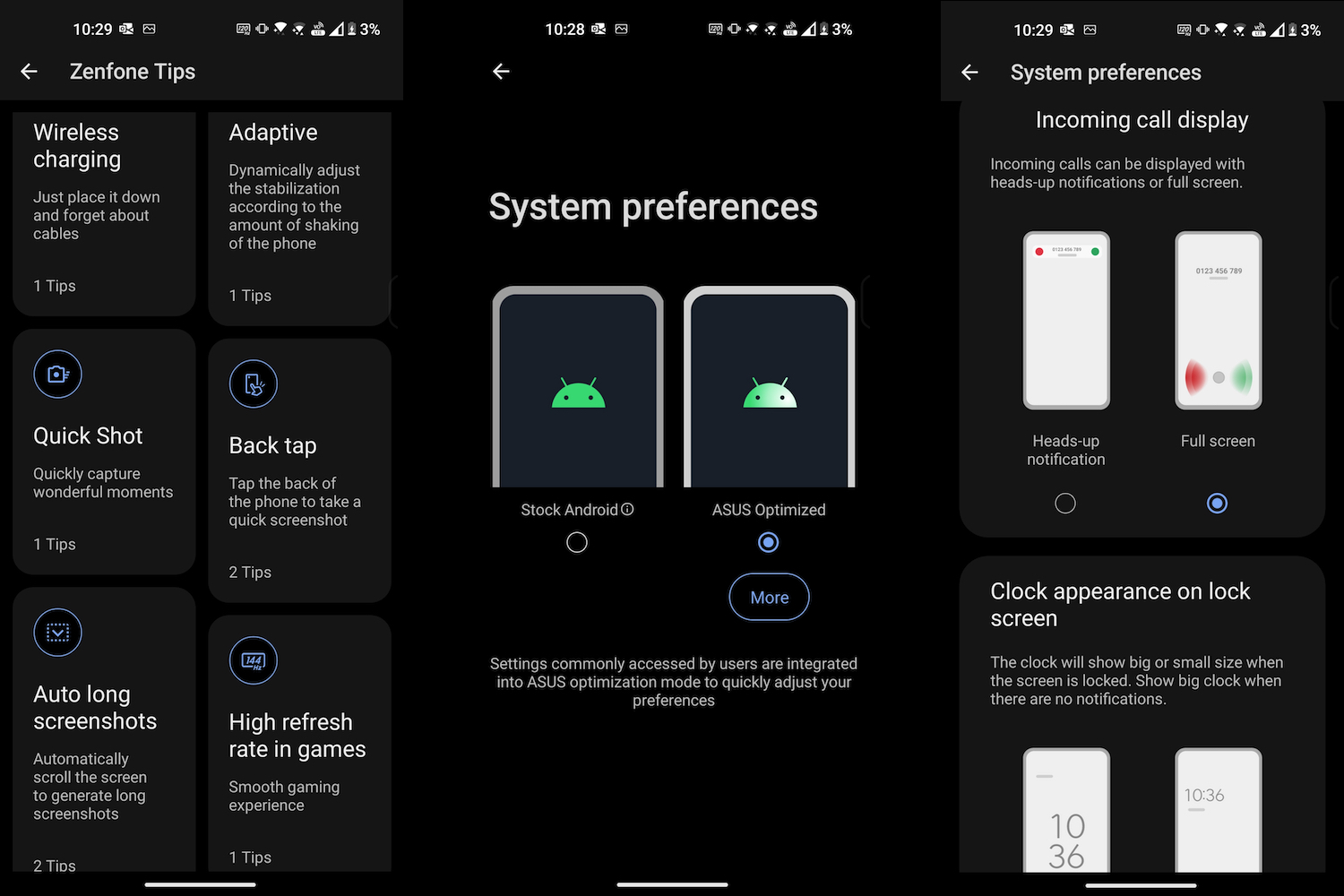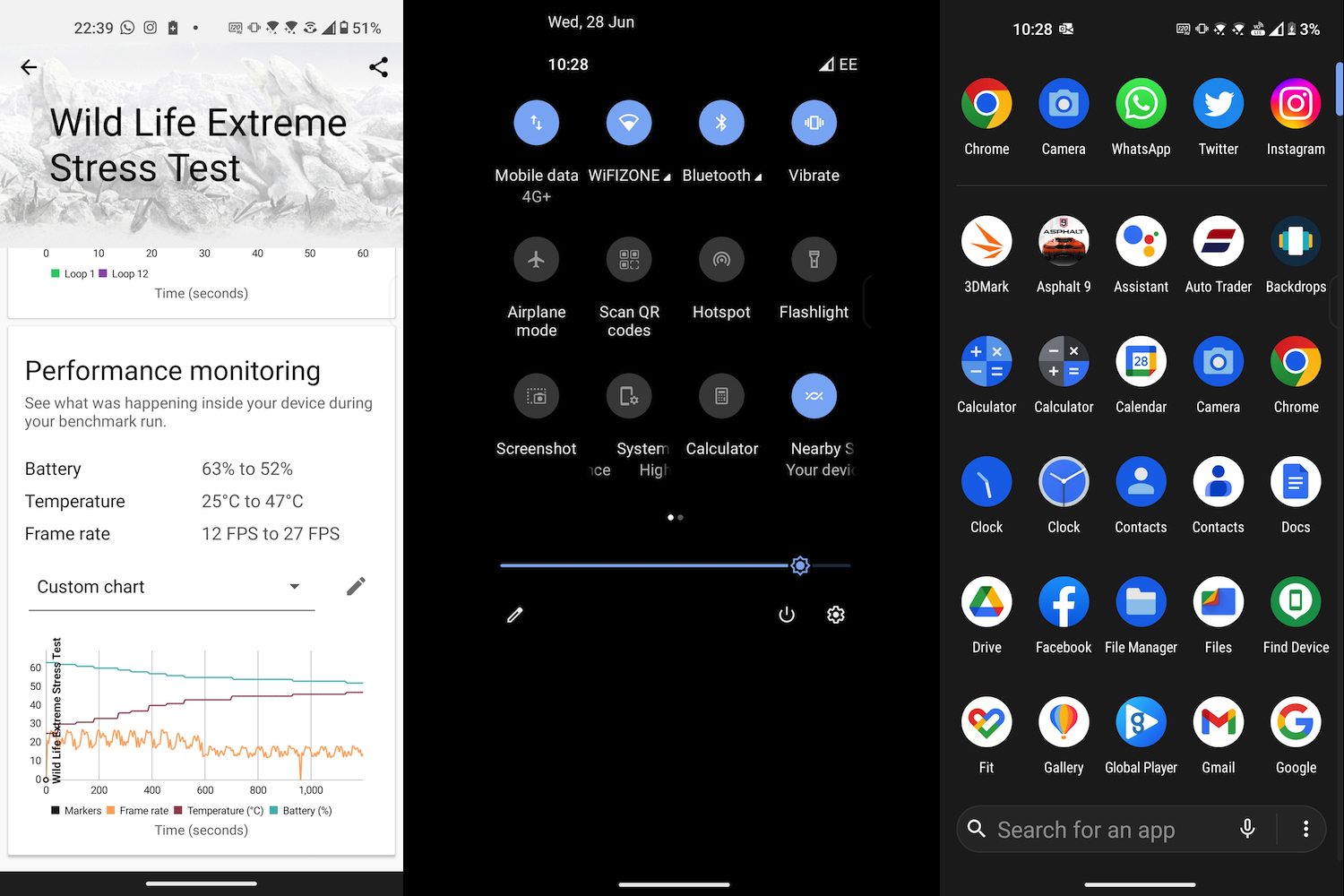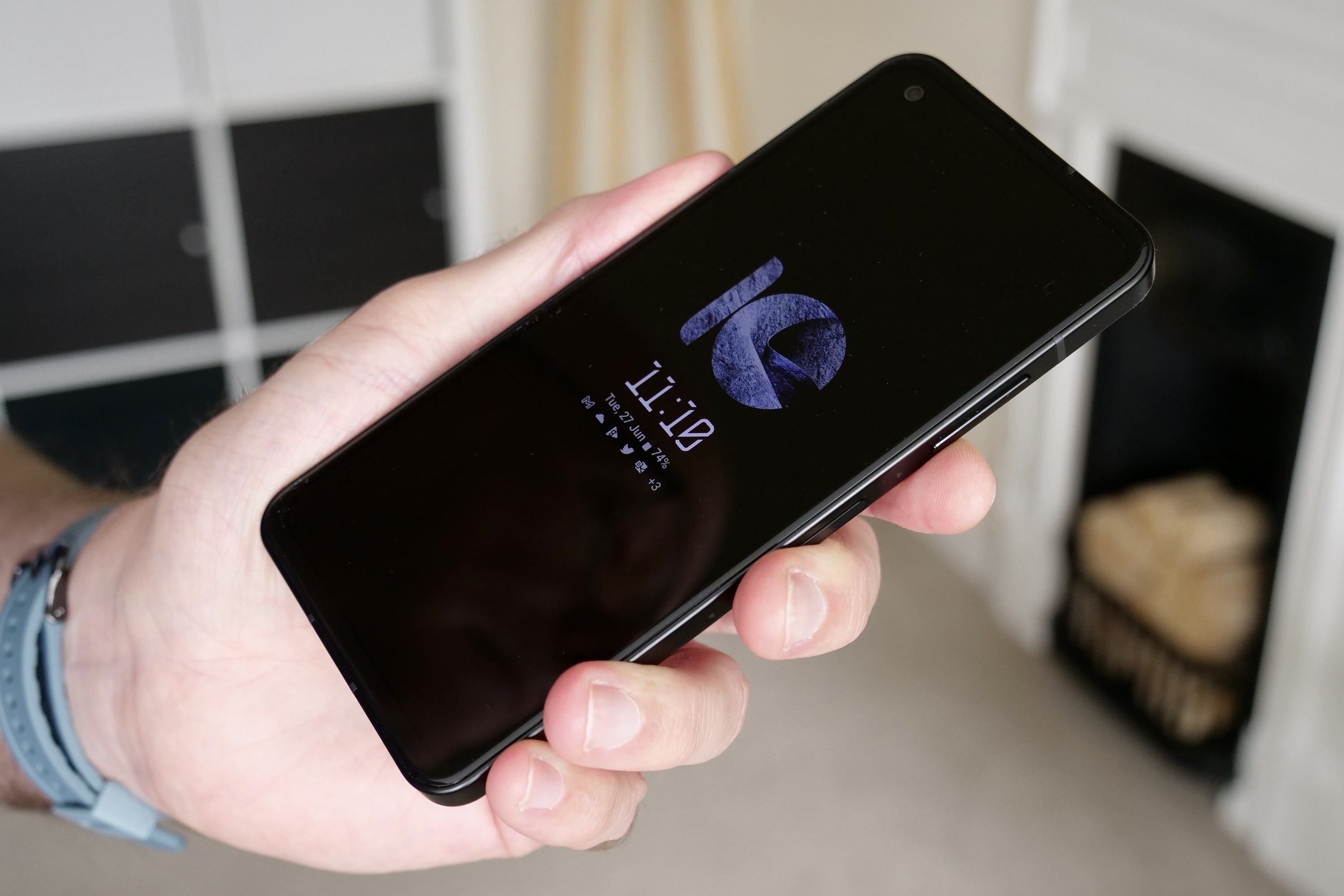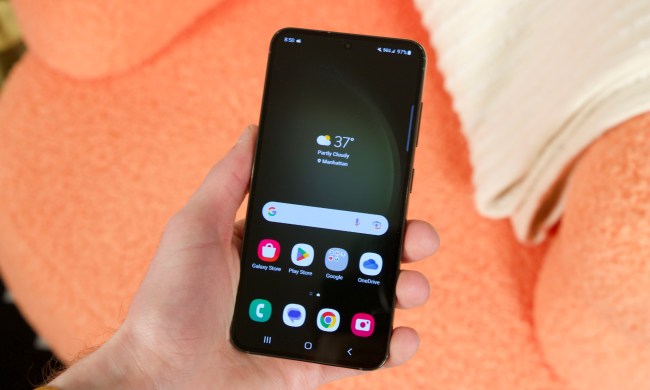“The Asus Zenfone 10 gets the size, software, and design right so it's a safe, sensible choice for your next phone. But the slow charging and disappointing camera really let it down.”
- Compact size is welcome
- Great performance
- Clean, simple software
- Slow charging speed
- Gimbal doesn't reach its potential
Asus loves serving a niche. It already does so with a dedicated gaming phone, and it’s back to doing something similar with the Zenfone 10.
With the Zenfone 10, Asus is looking at people sick of massive smartphones, who lust after devices that fit comfortably in their hands, pockets, and bags, yet still have all the power of their larger brethren. Is the Zenfone 10 a true compact flagship, and the anti-Galaxy S23 Ultra?
Asus Zenfone 10: design

The Asus Zenfone 10 is definitely compact. Like the Zenfone 9, Asus set out to make a phone less than 70mm wide and 150mm tall, claiming this is the ideal size for one-handed use. There’s not much to separate the design from the Zenfone 9 in general, with the rear panel dominated by two camera modules and the front with a still sizable 5.92-inch screen.
Thankfully, Asus has avoided making the Zenfone 10 look dull or ordinary. I love the small arrows dotted about the chassis and rear panel and the almost Star Trek-like Asus logo too. More than that, it has chosen a tactile, interesting material for the rear panel, which provides grip without attracting fingerprints. The muted, matte green color with its almost paper-like finish looks and feels excellent — and is a welcome change from boring black glass.

The chassis is quite thick at 9.4mm, but this does mean the side-mounted fingerprint sensor is easy to locate and use, plus there’s enough space to include a 3.5mm headphone jack. It all feels substantially made, yet it weighs just 172 grams, and it has Gorilla Glass Victus and an IP68 water resistance rating for durability.
Is the Zenfone 10 ideal for one-handed use? Definitely. My thumb comfortably reaches all the way across the screen, which isn’t possible with most modern flagship phones. Even better, it’s comfortable to do so as the chassis isn’t sharply tapered. It’s light enough not to be a burden in your pocket, and it hides itself nicely in a bag.
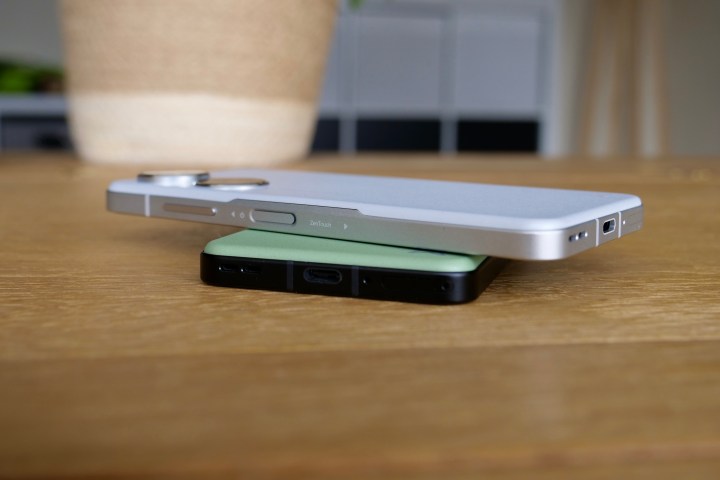
But while it’s small, it’s not too small, and playing games and watching videos is still fun. The dimensions aren’t all that different from the Samsung Galaxy S23 or the Apple iPhone 14, though, so it’s not as unique as you may initially think.
But it is different, and if owning the same phone as everyone else isn’t that appealing, the Zenfone 10 fills the space left free by Google now it has mostly enlarged the Pixel series — and by Sony, which has entirely abandoned the old Compact series. Size-wise, the Zenfone 10 works, but that leaves the question of whether it’s compromised elsewhere.
Asus Zenfone 10: screen and performance

There are no complaints about the performance. The Snapdragon 8 Gen 2 is the latest and the fastest chip from Qualcomm, and it’s paired to 16GB of RAM in my review model, making it a little rocket. The 5.92-inch screen is a colorful AMOLED with an FHD+ resolution and a maximum 144Hz refresh rate, although this is reserved for games, and it runs at 120Hz during general use. There’s 512GB of storage space, 5G, NFC, Bluetooth 5.3, stereo speakers with Dirac audio tuning, and a host of other audio functions — including Snapdragon Sound and AptX Adaptive.
The screen isn’t very bright, though, despite the 1100 nits peak, so it spends most of its time at near maximum brightness, and you need to look at it straight on to see it when outside in sunlight. The always-on screen is also very dim, with no way to adjust its brightness either, and it’s hard to see notifications sometimes. Despite the 144Hz refresh rate being reserved for certain games, it’s not a downside, and the 120Hz maximum is excellent for general use. I’ve had it set to auto (it switches between 60Hz, 90Hz, and 120Hz), and it has worked effectively.

The comprehensive Game Genie game optimization toolbox used in the ROG Phone series is onboard, where you can switch modes to match the game and your requirements. It exposes how the cooling isn’t as effective as Asus’s ROG Phone 7, as with the High Performance mode and 144Hz refresh rate active, even in fairly short 30-minute gaming sessions playing Asphalt 9: Legends, the Zenfone 10 does get quite warm to the touch. Not uncomfortably, but you definitely feel it. However, the game plays smoothly and is very fast.
If you want great sound, the Zenfone 10 delivers too. The stereo speakers have plenty of volume and produce a natural, fairly full sound for video and games. They do sound harsh at higher volumes, though, and can’t match the ROG Phone 7 for punch, but rarely are phone speakers worth highlighting at all, so the fact I’m talking about them on the Zenfone 10 should tell you how good they sound. Like the ROG Phone 7, there’s a lot of great audio tech in general, so it’s a strong multimedia device.
Asus Zenfone 10: gimbal video recording
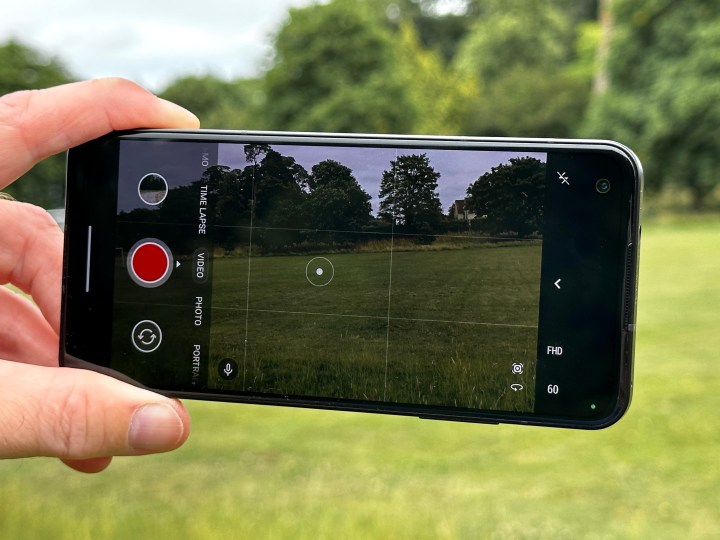
There are two cameras on the back of the Zenfone 10: a 50-megapixel main camera with an f/1.9 aperture, plus a 13MP wide-angle with a 120-degree field of view. The camera’s big selling point is a 6-axis gimbal stabilizer. This is an upgrade over the one fitted to the Zenfone 9 and promises smooth video recording and blur-free photos through a combination of optical and adaptive electronic image stabilization and auto-focus.
To make use of the gimbal, you’ll have to shoot a lot of videos, and videos in quite specific circumstances, to really see the benefits. There are two modes: Adaptive, which zooms in and out to maintain stabilization, and HyperSteady, which does not but is not available above FHD resolution. Adaptive works on both 4K and 8K resolution video. The gimbal also works when taking stills, and you can actively see it steadying the shot through the viewfinder.
The gimbal technology is clever, and in some action situations, it may be really good.
There’s no question that the Zenfone 10 shoots steady video. It’s noticeably less shaky than the iPhone 14 Pro when walking or running, but the quality of the video itself is much worse. It’s overly saturated, and you can see where the gimbal and its software are working in the background, resulting in video that’s nowhere near as pleasing to look at. The gimbal technology is clever, and in some action situations, it may be really good. But outside of those, you’ll likely be unimpressed by the video quality itself.
Asus Zenfone 10: camera

The look of video recordings is carried across to still images on the Zenfone 10. In some situations, it can take pretty, balanced photos. But when it gets it wrong, the results are disappointing.
Asus has used AI to dynamically enhance still photos in different areas — for example, altering the contrast and saturation of the sky independently from its surroundings, and you can often tell when it has been at work. Photos to which the effect has been applied can look artificial, and noise is often introduced in places.
Consistency between the main camera and wide-angle camera can also dramatically change, and lowlight performance isn’t very good, despite the gimbal trying to stabilize shots. The lack of a telephoto or optical zoom is unfortunate. Asus has an AI-driven feature that aims to improve the quality of 4x digital zoom images but does not provide shortcuts in the viewfinder. If you’re looking for detail, you won’t find it, but in some situations, it’s not as terrible as you may expect. At 2x and 4x, it’s usable enough. On the front is a 32MP selfie camera, which adds white pixels to the normal Red, Green, and Blue (RGB) pixel layout to boost quality in lowlight settings.
The Zenfone 10’s main camera is decent, but it can’t compete with the Pixel 7 or Pixel 7a on stills, and the gimbal is a little gimmicky and may not have widespread appeal. I miss the madness of old Zenfone models. The era of flip-up motorized cameras made the range stand out in a way the Zenfone 10 doesn’t, but it’s understandable why the company moved away from the expensive, gimmicky camera trickery.
What has replaced it is more sensible and less likely to cause durability concerns, but much less memorable and a lot less fun. The Zenfone 10’s camera has potential, and I like the gimbal as a feature, but overall the Zenfone 10’s camera is unrefined, and the results are too inconsistent to really enjoy using it.
Asus Zenfone 10: software
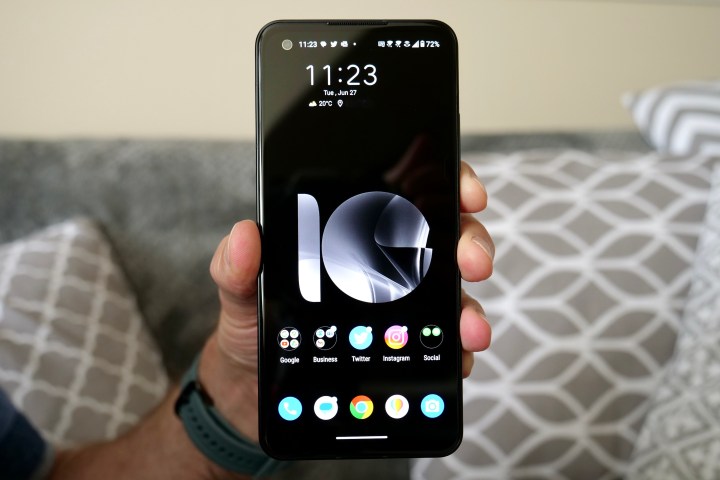
Asus takes a softly-softly approach to its version of Android. It’s Android 13 installed, and you have a choice of running a stock version or an Asus-optimized version. The overall design is very similar but in optimized mode, Asus tweaks things like the lock screen clock and the incoming call screen, plus it adds in several gestures and other small alterations. Most can also be manually added in when you use the stock version, so you won’t miss out either way.
It’s worth using some of Asus’s clever customization options, which can meaningfully improve the OS. For example, there’s a choice between the newer, bigger buttons for the Quick Settings screen or an “optimized” version with smaller circular icons. There are various gestures, including a Back Tap for a screenshot or to open the camera, and the fingerprint sensor can be swiped to bring down the notification shade. They’re all helpful, but most are off by default and never thrust at you as things you must try.
The Zenfone 10’s software is really quick, very reliable, and mostly fuss-free. There are very few pre-installed apps, and Asus’s stock tools – such as the Gallery and editor – are good. It’s closer to Google’s vision of Android on a Pixel than it is to Samsung’s One UI on a Galaxy S23. Asus promises to deliver two major operating system updates and four years of security updates. This is average but not as comprehensive as Samsung’s or OnePlus’s commitment to software updates. The software is a highlight of the Zenfone 10.
Asus Zenfone 10: battery life and charging
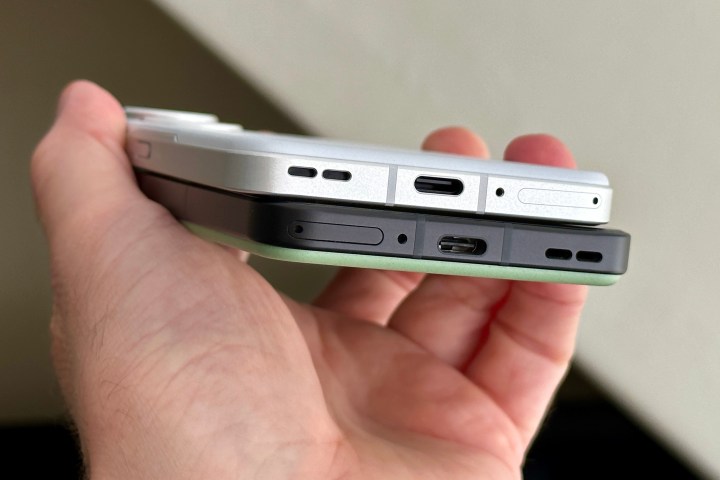
For the first time on a Zenfone product, Asus has added wireless charging. It sounds odd, but this is quite a step forward for the company, as it has long been unimpressed by the feature — and it hasn’t even been a part of the ROG Phone series. It’s finally here in all its 15W glory, and that’s about as exciting as it gets. It’s a helpful convenience feature and essential if the Zenfone 10 is to compete with the Galaxy S23, OnePlus 11, and iPhone 14.
It, along with a 30W HyperCharge wired option, charges a 4,300mAh cell, and unusually for a modern phone, there’s a compatible charging block and USB Type-C cable included in the box. Plug it in for 30 minutes, and the battery reaches about 50%, 75% after an hour, and on to full in around 100 minutes. This is slow, with the OnePlus 11’s super fast charging taking less than 30 minutes — and even the Galaxy S23 taking an hour to recharge its larger 5,000mAh battery.
Between four and five hours of screen time with 30 minutes of gaming, shooting video, and using GPS, results in the battery being depleted to around 20% at the end of the day. With three hours or less and no gaming, the battery will just about last two full days. Considering the size of the cell, this is decent performance and what I’d expect from phones like the Pixel 7. However, the slow charging really lets the Zenfone 10 down.
Asus Zenfone 10: price and availability
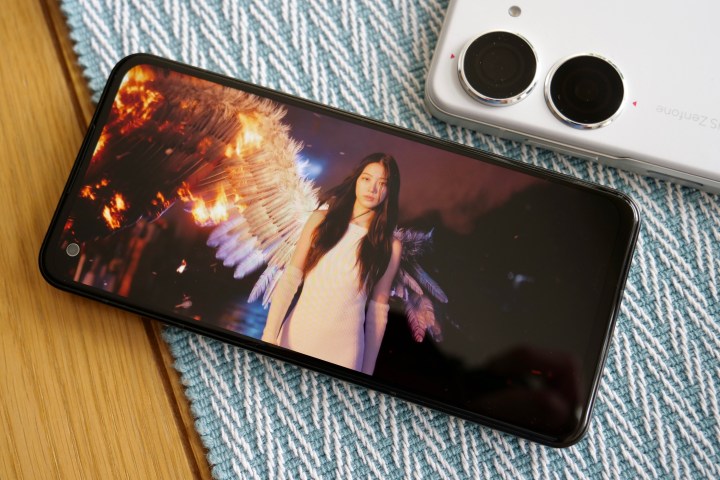
There are three different Zenfone 10 versions being released: a basic 6GB/128GB model, a more advanced 8GB/256GB model, and the top 16GB/512GB version. The Asus Zenfone 10 is available in the Aurora Green color seen in the majority of our photos, along with the Comet White (also seen here) plus Midnight Black, Starry Blue, and Eclipse Red.
Asus will release the Zenfone 10 in the U.S., the U.K., and elsewhere in the world, but not all exact dates and prices have been confirmed at the time of writing. It has been given a starting price of 799 euros in Europe, where it will be available from June 29. This matches the Zenfone 9’s price, and although it converts over to $875, it could eventually mean a $699 starting price for the Zenfone 10 in the U.S.
If it does repeat the same $699 price, it’ll be cheaper than the $799 Galaxy S23 and iPhone 14 but considerably more than the $499 Pixel 7a. The cheapest new Pixel is the dark horse here, as it’s not that much larger than the Zenfone 10, and the winning camera makes it a strong alternative to the Asus phone for anyone who doesn’t want to follow the herd. If you’re happy to spend $700 and don’t mind a bigger phone, the base OnePlus 11, with its fast charging and strong camera, should be at the top of your list.
Asus Zenfone 10: verdict
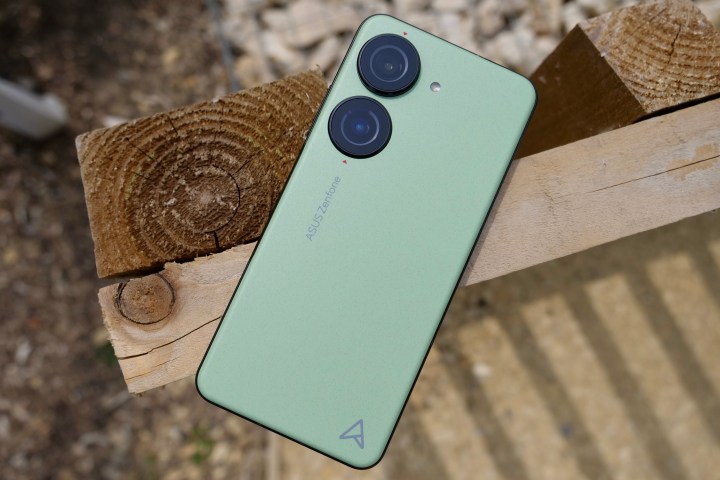
Asus hasn’t gone mad with updates over the Zenfone 9. It has the latest Snapdragon chip, more megapixels on the selfie camera, version 2.0 of the gimbal, and introduced wireless charging. It is the ideal companion device to the massive, powerful, and pretty crazy ROG Phone 7 in Asus’s range, but looked at in isolation, it struggles to find its place.
It’s competent, pretty, and powerful, but there’s not much that makes it really special. The size and weight are consistent with its main competition, which aren’t really thought of as “compact” phones at all, and anyone missing the 5-inch Sony XZ2 Compact will still find it too big. Wireless charging certainly isn’t a reason to get excited, which leaves the gimbal camera as the top (only?) technical reason to choose the Zenfone 10 over any other phone.
The Asus Zenfone 10 is a safe choice.
As a smaller manufacturer, Asus has to provide something Google, Samsung, and Apple don’t — rather than try and compete on outright camera ability or sell at rock bottom prices like Realme and brands like Poco. The gimbal is unique, but you’ll have to shoot a lot of video to make it a feature you notice, and the slow charging makes ownership less convenient than other phones. The Galaxy S23 is such a good all-rounder it’s safe from being overthrown, as is the Pixel 7a due to its mega camera, but if you fancy something different and aren’t that bothered about the camera, the Zenfone 10 still does a lot of things right.
The Asus Zenfone 10 is a safe choice with its clean and fast software, durability, good design, and decent longevity through top performance. You’ll stand out from the crowd wielding the Zenfone 10, but it lacks the wow factor that will impress when you explain why you bought it.



















